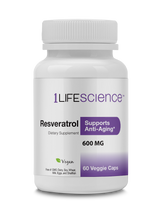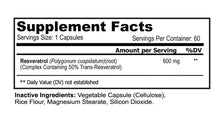- Supports Anti-Aging*
- Supports healthy cholesterol*
- Aids in cardiovascular function*
- Used to prevent cognitive decline*
- Aids in delaying cellular aging*
- May protect against blood clots*
- Vegan
Resveratrol, a phytoalexin with a wide range of pharmacological properties is synthesized by plants in response to stress, injury, infection or UV radiations. As it is a secondary metabolite with many health promoting properties, various methods employing microorganisms and genetic manipulation of different synthetic enzymes, has been comprehensively studied to increase its production. Its rapid metabolism and low bioavailability have been addressed by the use of bioenhancers, and nano-formulations. This flavonoid is extensively researched due to its pharmacological properties such as anti-oxidative, anti-inflammatory and immune-modulating effects. Knowledge of these properties of resveratrol has led to elaborate studies on its effect on diabetes, neurodegenerative diseases, cancer, aging, obesity and cardiovascular diseases. At molecule level it targets sirtiun, adenosine, monophosphate kinase, nuclear Factor-kb, inflammatory cytokines. Anti-oxidant enzymes along with cellular processes such as angiogenesis, apoptosis, mitochondrial biogenesis, gluconeogenesis and lipid metabolism. This review discusses the properties of resveratrol and the different approaches of addressing the unfavorable synthesis and pharmacokinetics of this stilbene. Pre-clinical evaluations of resveratrol on diabetes mellitus, cardiovascular and neurological diseases are elaborately discussed and the underlying pathways involved in its therapeutic activity have been given paramount importance. Following the pre-clinical studies, clinical trials on the same reveal the efficacy of resveratrol in the effective management of these diseases. This review provides an intricate insight on resveratrol’s significance from a dietary component to a therapeutic agent.*




